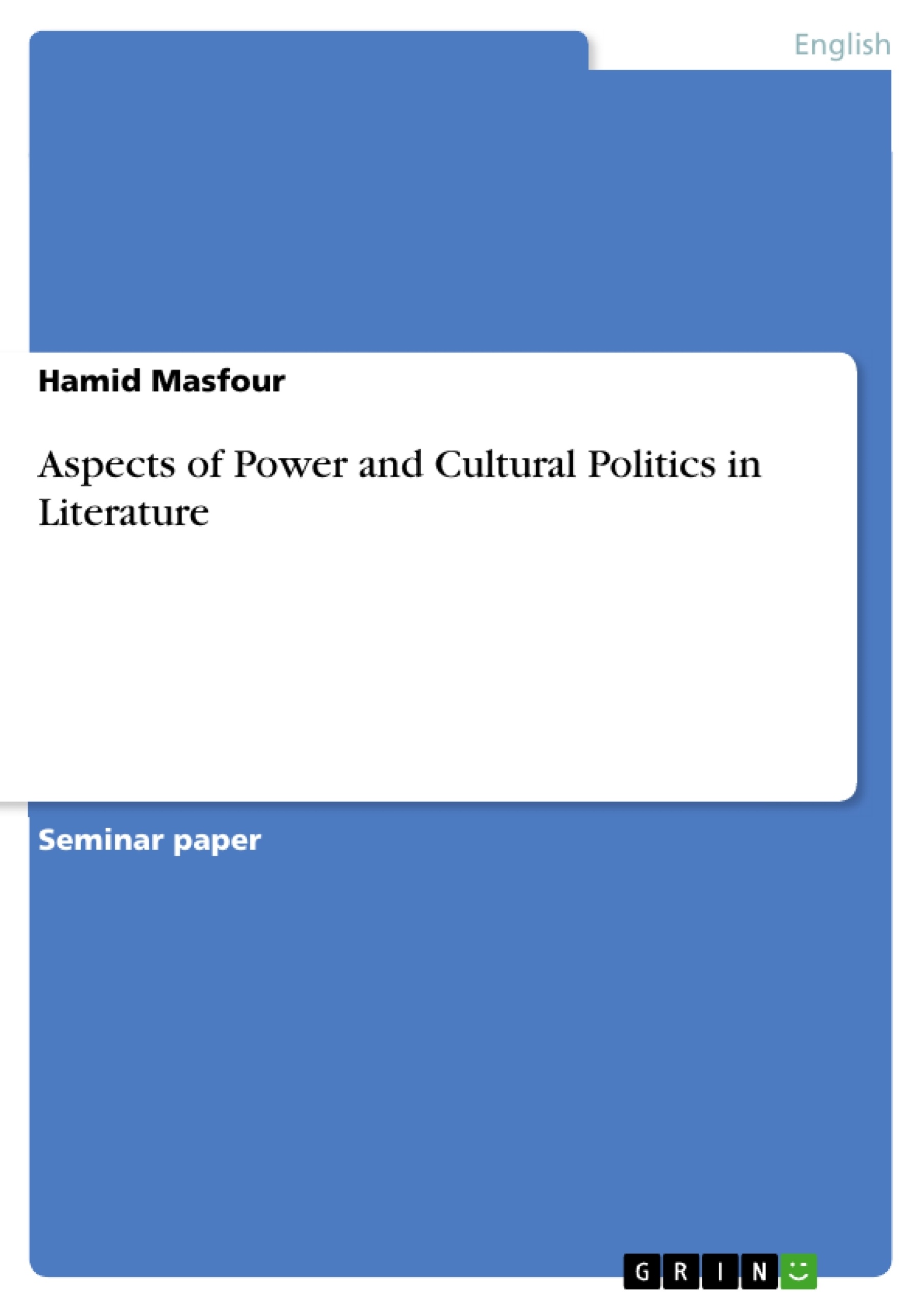In a way or another, literature underlies subtle discursive processes that either inform the text with a power regime or contest it through a disruptive counter-discourse.
Taking part in circulating power-laden cultural values legitimating or countering the status- quo, literature has been a fertile ground for different currents of critical and cultural studies such as postcolonial, feminist and literary theory.
In this context, the argument of this paper investigates through examples of different literary genres how literature has always been amid a tug of war either endorsing hegemonic power representations or taking a position of resistance.
Inhaltsverzeichnis (Table of Contents)
- Aspects of Power and Cultural Politics in Literature
- Power and Cultural Politics in Classical Tragedy
- The Great Chain of Being
- Tragic Heroes and Power
- Modern Tragedies and the Power Discourse
- Arthur Miller's Death of a Salesman
- Arthur Miller's A View from the Bridge
- Power and Cultural Politics in Poetry
- Classical Poetry and Power
- Romantic Poetry and the Counter-Discourse
- T.S. Eliot's The Waste Land
- Power and Cultural Politics in Novels
- H.G. Wells's A Modern Utopia
- George Orwell's 1984
Zielsetzung und Themenschwerpunkte (Objectives and Key Themes)
This paper aims to investigate how literature, across different genres, has been a site of both the endorsement and resistance of hegemonic power representations. The paper explores the ways in which literature has been used to legitimate or challenge the status quo, examining examples from classical tragedy, modern drama, poetry, and novels.
- The relationship between literature and power dynamics
- The role of literature in shaping and challenging cultural values
- The interplay of hegemonic power and counter-discourse in literary works
- The impact of social and historical contexts on literary representations of power
- The influence of different literary genres on the articulation of power relationships
Zusammenfassung der Kapitel (Chapter Summaries)
- The first chapter examines the role of classical tragedy in reinforcing a hierarchical worldview, focusing on the concept of the Great Chain of Being and the portrayal of tragic heroes as victims of uncontrollable powers.
- The second chapter explores how modern tragedies, such as Arthur Miller's Death of a Salesman and A View from the Bridge, challenge the traditional power discourse by portraying ordinary individuals struggling against secular powers.
- The third chapter analyzes the relationship between poetry and power, examining how classical poetry adhered to strict norms and values, while Romantic poets sought to break free from these constraints and give voice to the suppressed majority. It also discusses T.S. Eliot's The Waste Land as a work that challenges Eurocentric perspectives and critiques totalitarian power structures.
- The fourth chapter focuses on the novel, contrasting H.G. Wells's A Modern Utopia, which advocates for a centralized and unified state, with George Orwell's 1984, which depicts a dystopian world where individual freedom is suppressed by a totalitarian regime.
Schlüsselwörter (Keywords)
This paper explores concepts such as power, cultural politics, hegemony, counter-discourse, classical tragedy, modern drama, poetry, novels, social hierarchies, capitalism, colonialism, feminism, literary theory, and the relationship between literature and society. It also examines specific literary works and their authors, including Arthur Miller, T.S. Eliot, H.G. Wells, and George Orwell.
Frequently Asked Questions
How does literature represent power regimes?
Literature can either endorse hegemonic power representations or contest them through disruptive counter-discourses, depending on the genre and context.
What is the "Great Chain of Being" in classical tragedy?
It is a hierarchical worldview used in classical tragedies to reinforce social hierarchies and portray tragic heroes as subjects of uncontrollable, higher powers.
How do Arthur Miller's tragedies challenge traditional power structures?
Works like "Death of a Salesman" shift the focus to ordinary individuals struggling against modern secular powers and capitalism rather than divine fate.
What is the significance of T.S. Eliot's "The Waste Land"?
The poem is analyzed as a work that challenges Eurocentric perspectives and critiques totalitarian power structures through its fragmented narrative.
How do H.G. Wells and George Orwell differ in their political outlooks?
Wells's "A Modern Utopia" advocates for a centralized state, while Orwell's "1984" presents a dystopian critique of how such states suppress individual freedom.
- Quote paper
- Hamid Masfour (Author), 2016, Aspects of Power and Cultural Politics in Literature, Munich, GRIN Verlag, https://www.grin.com/document/349820



